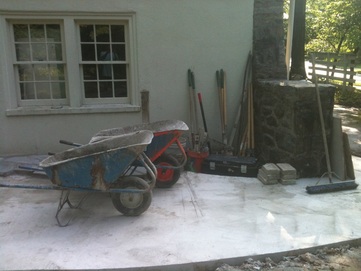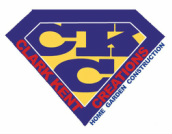
And indeed, my arsenal of tools has grown considerably over the years. Some of my tools are the bread and butter of what we do, they get used on a near daily basis and we couldn’t even begin to think about starting a job without them. Things like shovels, wheelbarrows, mattocks, and digging bars to name a few.
Other tools may have been purchased at one point to complete a specific job, but now sit idly in my garage waiting for their next opportunity.
As you may imagine, I have a sizeable amount invested in my fleet of tools. It’s a necessary cost of doing business, and quite frankly I have no problem whatsoever investing in tools that will help me get the job done right and my business grow.
What I do have a problem with however is when tools get misused for the wrong job or not taken care of properly.
Let’s take the shovel for instance. I’ve had shovels that have lasted me 10 years plus, getting used on an almost daily basis. I had one square shovel in fact that I finally had to replace only because the metal “scoop” part had worn down so much that I was left with just about 4” between the end of the shaft and tip of the blade.
A shovel is meant to be used for digging. Not chopping roots, not prying up large boulders, and not as a hammer. I don’t care how high-end your shovel is, a $30 shovel will break just as quickly as a $10 shovel if you don’t use it properly. If you’re digging and come across a large stone, go get your digging bar and pry it out using the right tool. If you come across a large root, go get your mattock. A few basic handtools can expedite any job and last for a long time as long as you’re using each one for the correct application.
A screwdriver is not a chisel. A pipe wrench is not a hammer. A level is not a concrete screed. You’re not going to be able to make clean successful finishing cuts with a sawzall. Not only is using the incorrect tool a potential safety hazard, the job probably won’t get done as well using the wrong tool, and the risk of damaging the tool is quite real.
And yes, sometimes when you’re in the throws of completing a job, it can be a pain to stop what you’re doing to walk over and grab the correct tool, and certainly tempting to use that shovel as a pry-bar. Until it breaks. And now not only do you still have to get your pry-bar, you also have to grab another shovel, or worse yet leave the site altogether and go spend money that shouldn’t be being spent on a new shovel. Time and money out the door. Use the right tool for the right job.
And speaking of time, keep your tools organized. There is nothing more infuriating than being on a jobsite, identifying the correct tool for a project, knowing you have the tool, and then spending 15 minutes looking for it. I like to keep all my tools organized by task. I have a toolbox with all the basic everyday tools we need – hammers, screwdrivers, wrenches, pliers, etc. I have a bucket specifically for concrete finishing tools. Another one for chisels and stone hammers. Another one for levels and string lines. And a few other buckets and boxes for other various specialties.
When we’re done with the tools, they go back in the correct box or bucket. That way we’ll know where they are come the next time we need them. Larger handtools like shovels and rakes get stored together, in a neat and orderly fashion, so when we need them the next time they’re easily accessible without disturbing a pick-up-sticks-style pile just to get that bow rake on the bottom of the pile.
Hoses, extension cords, and ropes should be coiled or reeled up neatly when not in use. There’s nothing worse than spending 15 minutes or more of your valuable time trying to make sense of a rat’s nest mess of tangled up cords or ropes. Or plugging in a 100’ extension cord only to realize that it’s now about 60’because of all the tangles and knots.
Tools that are used for concrete or mortar work should be rinsed and cleaned thoroughly following each job. A $100 concrete bullfloat can be easily ruined simply by not wiping the float clean. One little concrete bump, one little knick in the surface, and you’ll never achieve a smooth finish. Trowels, floats, finishing tools, levels and any other tools that may get a little“mucky” during the course of a concrete or mortar job should all be thoroughly cleaned following each job. That way they’ll be ready and functional the next time we need them.
Follow these basic precautions, take a few extra minutes to grab the right tool for each job, take the time to keep tools organized and cleaned properly, and you too might just get 10 years’ plus service out of a shovel.




 RSS Feed
RSS Feed